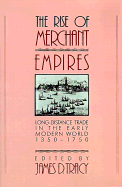Book contents
- Frontmatter
- Contents
- Preface
- Maps
- Introduction
- 1 Structural changes in European long-distance trade, and particularly in the re-export trade from south to north, 1350–1750
- 2 The growth and composition of trade in the Iberian empires, 1450–1750
- 3 The growth and composition of the long-distance trade of England and the Dutch Republic before 1750
- 4 France, the Antilles, and Europe in the seventeenth and eighteenth centuries: renewals of foreign trade
- 5 Productivity, profitability, and costs of private and corporate Dutch ship owning in the seventeenth and eighteenth centuries
- 6 The Dutch and English East India companies compared: evidence from the stock and foreign exchange markets
- 7 World bullion flows, 1450–1800
- 8 Merchant communities, 1350–1750
- 9 Economic aspects of the eighteenth-century Atlantic slave trade
- 10 Marginalization, stagnation, and growth: the trans-Saharan caravan trade in the era of European expansion, 1500–1900
- 11 The “decline” of the central Asian caravan trade
- 12 Merchant communities in precolonial India
- 13 Merchants without empire: the Hokkien sojourning communities
- Index
3 - The growth and composition of the long-distance trade of England and the Dutch Republic before 1750
Published online by Cambridge University Press: 01 June 2011
- Frontmatter
- Contents
- Preface
- Maps
- Introduction
- 1 Structural changes in European long-distance trade, and particularly in the re-export trade from south to north, 1350–1750
- 2 The growth and composition of trade in the Iberian empires, 1450–1750
- 3 The growth and composition of the long-distance trade of England and the Dutch Republic before 1750
- 4 France, the Antilles, and Europe in the seventeenth and eighteenth centuries: renewals of foreign trade
- 5 Productivity, profitability, and costs of private and corporate Dutch ship owning in the seventeenth and eighteenth centuries
- 6 The Dutch and English East India companies compared: evidence from the stock and foreign exchange markets
- 7 World bullion flows, 1450–1800
- 8 Merchant communities, 1350–1750
- 9 Economic aspects of the eighteenth-century Atlantic slave trade
- 10 Marginalization, stagnation, and growth: the trans-Saharan caravan trade in the era of European expansion, 1500–1900
- 11 The “decline” of the central Asian caravan trade
- 12 Merchant communities in precolonial India
- 13 Merchants without empire: the Hokkien sojourning communities
- Index
Summary
INTRODUCTION
Intercontinental trade in the period known variously as the age of commercial capitalism and the age of European expansion is a well studied but still-elusive field of historical research. Numerous detailed studies on particular branches of trade, areas of production, commercial routes, or points of distribution, often based on sources that make quantification possible, offer a mass of information on various aspects of the history of trade. At the same time the totality remains elusive; the information is not easily compared or summed up, not even when it happens to be complete and reliable. Any attempt to sum up our knowledge of the volume and composition of early modern long-distance trade must remain preliminary and open to revision.
More than twenty-five years ago F. Mauro appealed to his colleagues to cooperate internationally in order to reconstruct the commodity flows between continents in this period. Since then more details and better statistical information have been uncovered, but his plea for cooperation among scholars was not heard, and today we are not much closer to a comprehensive understanding of the economic interrelations between the continents in the early modern period than we were twenty-five years ago. It is to be hoped that this volume will be a step in the right direction, especially because of the growing interest, not only among historians, in the history of intercontinental trade in the early modern period.
- Type
- Chapter
- Information
- The Rise of Merchant EmpiresLong Distance Trade in the Early Modern World 1350–1750, pp. 102 - 152Publisher: Cambridge University PressPrint publication year: 1990
- 14
- Cited by



